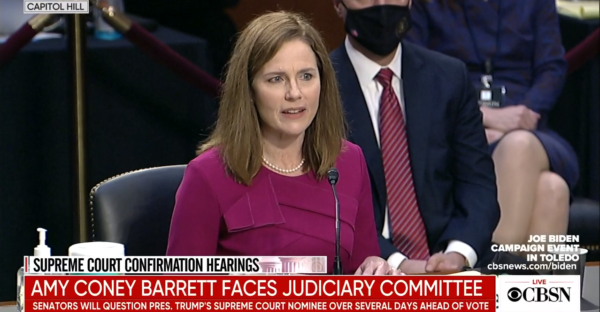
It’s all polite and delivered with a common voice of concern, but Democrats on the Senate Judiciary Committee making opening statements clearly aimed at casting doubt on her ability to make rulings on abortion, health care and gun rights due to her Catholicism and conservatism are signaling their strong opposition to confirming Judge Amy Coney Barrett to the U.S. Supreme Court.
Democrats are clearly worried about protecting Obamacare—perhaps a remaining hallmark of the previous president’s administration.
The hearings opened Monday morning as Judge Barrett sat quietly, wearing a facemask, while listening to bouquets and brickbats. As reported by the Associated Press via the Seattle P-I.com, “Senate Democrats branded Supreme Court nominee Amy Coney Barrett a threat to Americans’ health care during the coronavirus pandemic Monday at the start of a fast-tracked hearing…”
On the Second Amendment, Judge Barrett has a thin record, but according to Ilya Shapiro, director of the Robert A. Levy Center for Constitutional Studies, “Judge Barrett, unlike many of her colleagues on the circuit courts, takes the Second Amendment seriously, using the text, structure, and history of the Constitution to understand and apply the rights protected.” Shapiro, publisher of the Cato Supreme Court Review, was quoted by Fox News.
Ranking member Dianne Feinstein (D-CA) promised Democrats will challenge Judge Barrett on Obamacare and other issues.
In a separate report, Fox News identified issues that worry Democrats. They include the Affordable Care Act, abortion rights and “gun issues.”
“The bottom line is,” said a Fox report, “Democrats need to tread lightly. Senate Majority Leader Mitch McConnell, R-Ky., has the support of Republicans to move forward with the confirmation process and confirm Barrett on the Senate floor before Nov. 3, barring any development in her vetting. Democrats don’t want to create a ‘Barrett effect’ and lose their chance of winning a Senate majority in 2020.”
During her opening statement, Judge Barrett recalled her days as a law clerk for the late Associate Justice Antonin Scalia, and stressed “Courts have a vital responsibility to enforce the rule of law, which is critical to a free society. But courts are not designed to solve every problem or right every wrong in our public life. The policy decisions and value judgments of government must be made by the political branches elected by and accountable to the People. The public should not expect courts to do so, and courts should not try.
“That is the approach I have strived to follow as a judge on the Seventh Circuit,” she said.
“In every case,” Judge Barrett stated, “I have carefully considered the arguments presented by the parties, discussed the issues with my colleagues on the court, and done my utmost to reach the result required by the law, whatever my own preferences might be. I try to remain mindful that, while my court decides thousands of cases a year, each case is the most important one to the parties involved. After all, cases are not like statutes, which are often named for their authors. Cases are named for the parties who stand to gain or lose in the real world, often through their liberty or livelihood.”
As reported by the Associated Press, “Barring a dramatic development, Republicans appear to have the votes to confirm Barrett to a lifetime seat on the Supreme Court. If she is confirmed quickly she could be on the Supreme Court when it hears the latest challenge to the Affordable Care Act, a week after the election.”